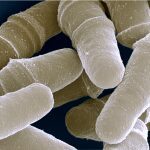Lien vers Pubmed [PMID] – 19197239
EMBO J. 2009 Mar;28(6):632-40
In humans, a mutation in the tyrosyl-DNA phosphodiesterase (Tdp1) is responsible for the recessively inherited syndrome spinocerebellar ataxia with axonal neuropathy (SCAN1). Tdp1 is a well-conserved DNA repair enzyme, which processes modified 3′ phospho-DNA adducts in vitro. Here, we report that in the yeast Schizosaccharomyces pombe, tdp1 mutant cells progressively accumulate DNA damage and rapidly lose viability in a physiological G0/quiescent state. Remarkably, this effect is independent of topoisomerase I function. Moreover, we provide evidence that Tdp1, with the polynucleotide kinase (Pnk1), processes the same naturally occurring 3′-ends, produced from oxidative DNA damage in G0. We also found that one half of the dead cells lose their nuclear DNA. Nuclear DNA degradation is genetically programmed and mainly depends on the two DNA damage checkpoint responses, ATM/Tel1 and ATR/Rad3, reminiscent to programmed cell death. Diminishing the respiration rate or treating cells with a low concentration of antioxidants rescues the quiescent tdp1 mutant cells. These findings suggest that mitochondrial respiration causes neuronal cell death in the SCAN1 syndrome and in other neurological disorders.


